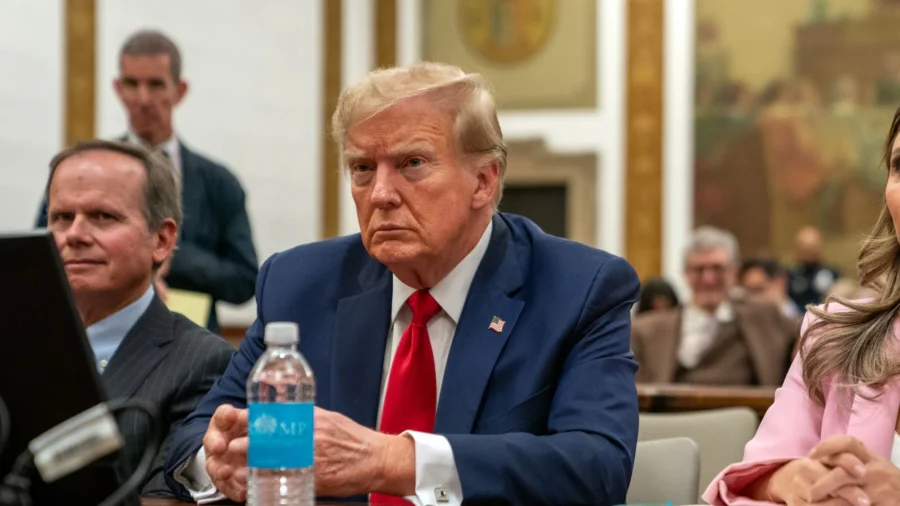On Thursday, New York Supreme Court Justice Arthur Engoron entered an order outlining the role of a third-party monitor over the Trump Organization that will last at least three years, noting that the defense should keep the monitor apprised of any surety bond negotiations and agreements.
“The Monitor shall review Defendants’ internal accounting controls, governance, record-keeping, and financial reporting policies and procedures,” the judge ordered.
Former Judge Barbara Jones has been the court-appointed monitor since November 2022 and will continue in this role. Justice Engoron ordered that Ms. Jones shall be entitled to hire outside services as she deems necessary—at the expense of the defendant. A separate independent director of compliance (IDC) will also be appointed, and both will be immune from suit by the defendants.
Former President Donald Trump is currently trying to put up a bond the defense has argued is a “practical impossibility” in order to stop New York Attorney General Letitia James from seizing Trump Organization assets while President Trump appeals a civil fraud verdict.
The judgment total is $363 million, but breaks down with about $355 million of that specifically applying to President Trump, $4 million to be recovered from Eric Trump, $4 million to be recovered from Donald Trump Jr., and $1 million to be recovered from former Trump Organization finance chief Allen Weisselberg.
With the applied 9 percent interest, court filings say the bond comes out to more than $464 million, with a little more than $10 million of that attributed to judgment on Eric Trump, Donald Trump Jr., and Mr. Weisselberg.
Bond Efforts
The defendants were ordered to “inform the Monitor, in advance, of any efforts to secure surety bonds, including any financial disclosures requested or required, any information provided in response to such requests, any representations made by Trump Organization in connection with securing such bonds, any personal guarantees made by any of the Defendants, and any obligations of the Trump Organization required by the surety.”
Defense counsel has pushed back on the $464 million bond, arguing that it is “impossible” as “diligent” efforts by four brokers and 30-some negotiations with the world’s largest sureties have proven over the last several weeks.
But state attorneys recently urged the court not to lower the amount required, arguing that the defendants haven’t shown proof a $464 million bond is truly impossible before the court ordered the improperly filed surreply to be withdrawn.
The defense then wrote a letter to the court pointing out that the examples the state cited of large appeal bonds paid in full were “enormous” conglomerates like Samsung (market cap $98.5 billion), Cox Enterprises (annual revenue $22.1 billion), and SAP SE (market cap $220.5 billion) paying bonds of $1 billion.
They blasted the state’s suggestion that they turn over real estate interests to the court as “both impractical and unjust” and noted that the court-appointed monitor overseeing business operations already, in practice, will prevent the risk of assets being divested as the attorney general fears.
“Perhaps worst of all, the Attorney General argues that Defendants should be forced to dispose of iconic, multibillion-dollar real-estate holdings in a ‘fire sale,’” the defense added.
The state had suggested it was preferable for the defendants to do so rather than have the state take the risk of needing to quickly sell off the buildings. The defense argued it would be “textbook irreparable injury” to order the defendants the sell the assets they were appealing to protect.
Monitor Role
The judge ordered the defendants to provide Ms. Jones with access to day-to-day operations as it relates to accounting and finances within 30 days, and ordered Ms. Jones to issue a report and recommendations on the Trump Organization’s “internal controls and governance” within 60 days of receiving access.
“Neither the Monitor nor the IDC shall have the responsibility or authority to approve, disapprove, execute, or sign any financial disclosures,” the order reads. “To the extent the IDC or the Monitor observes any material misstatements, misrepresentations, or omissions, the Monitor shall immediately report such observations to the court.”
The order requires the Trump Organization to provide monthly copies of bank and brokerage statements to Ms. Jones within five days of the end of each month and give five days’ notice of any transfer of cash or assets outside the trust if they reach $5 million.
Any creation or dissolution of business entities will require 30 days’ notice and extensive detail about the new or closed entity. Restructuring or payment of debt or equity also needs to be reported, but deadlines were not provided.
Ms. Jones will issue quarterly reports to the court going forward and can, but is not required to, share the drafts with the defense.
During the three-year period, the court can alter the order if it deems necessary, and the state can also petition for changes. Additional penalties may be ordered if the court finds a violation of the monitorship order, and at the end of the three-year period, the monitorship could end or be extended, but the judge did not outline those standards.
From The Epoch Times


